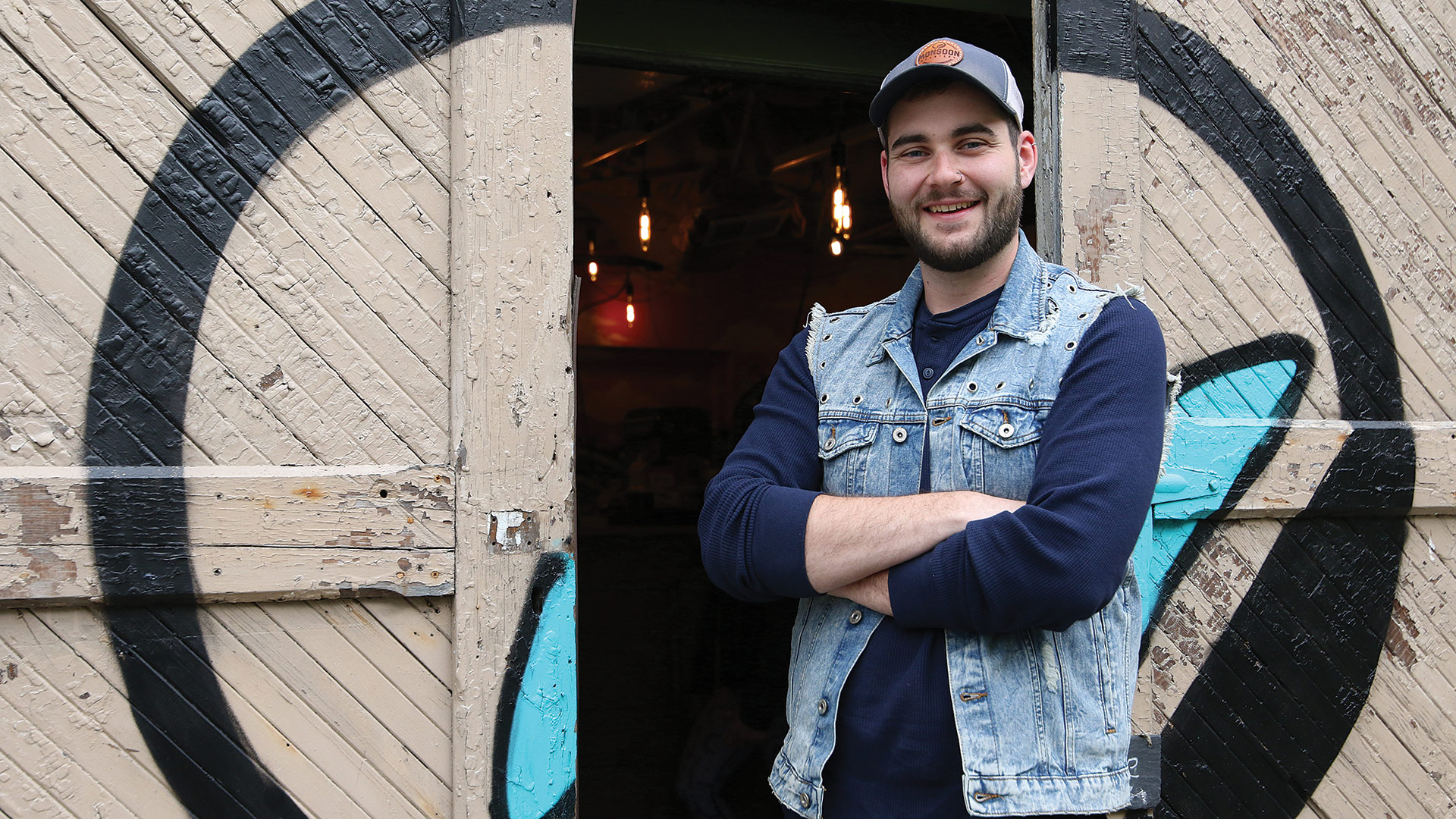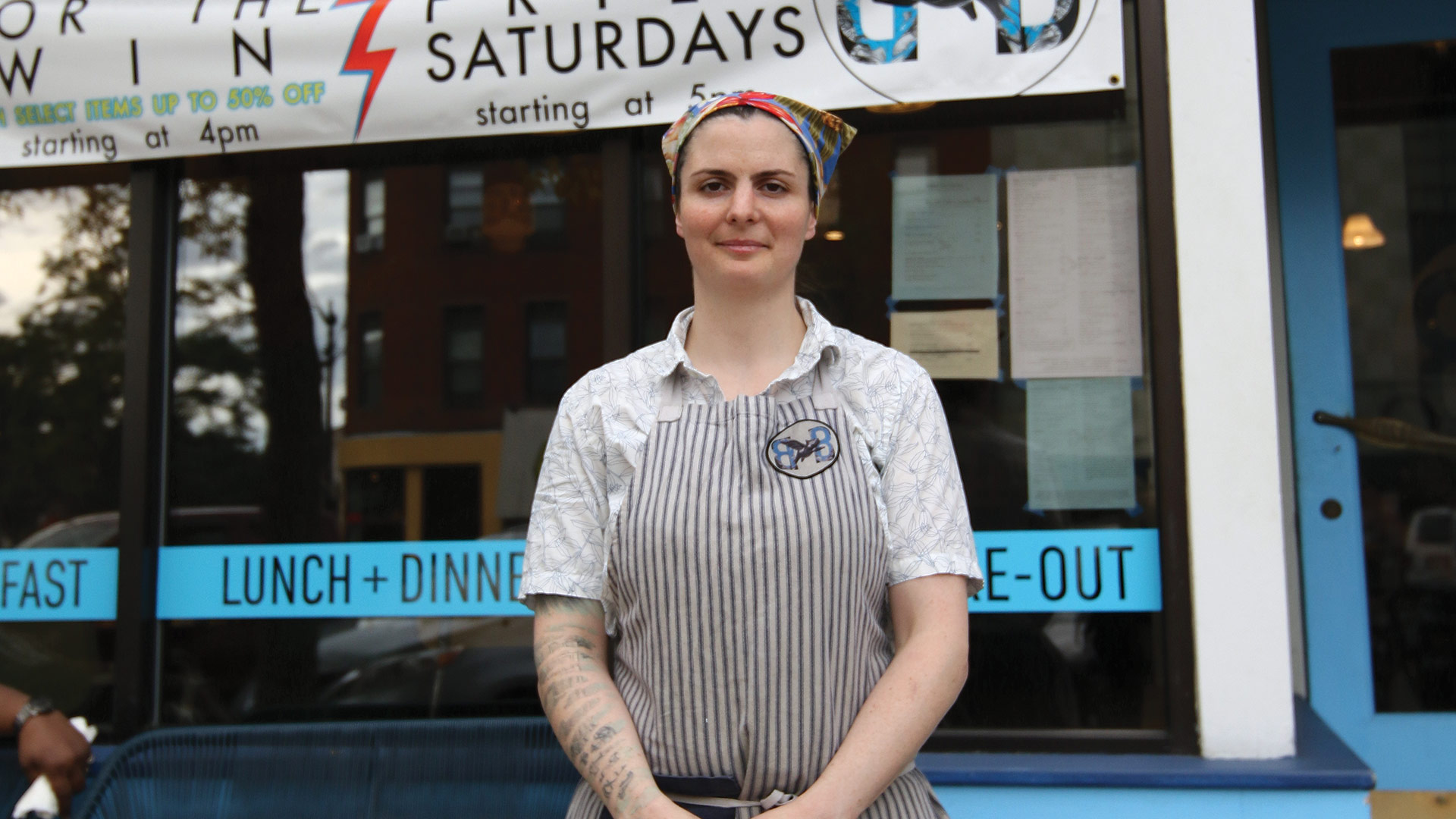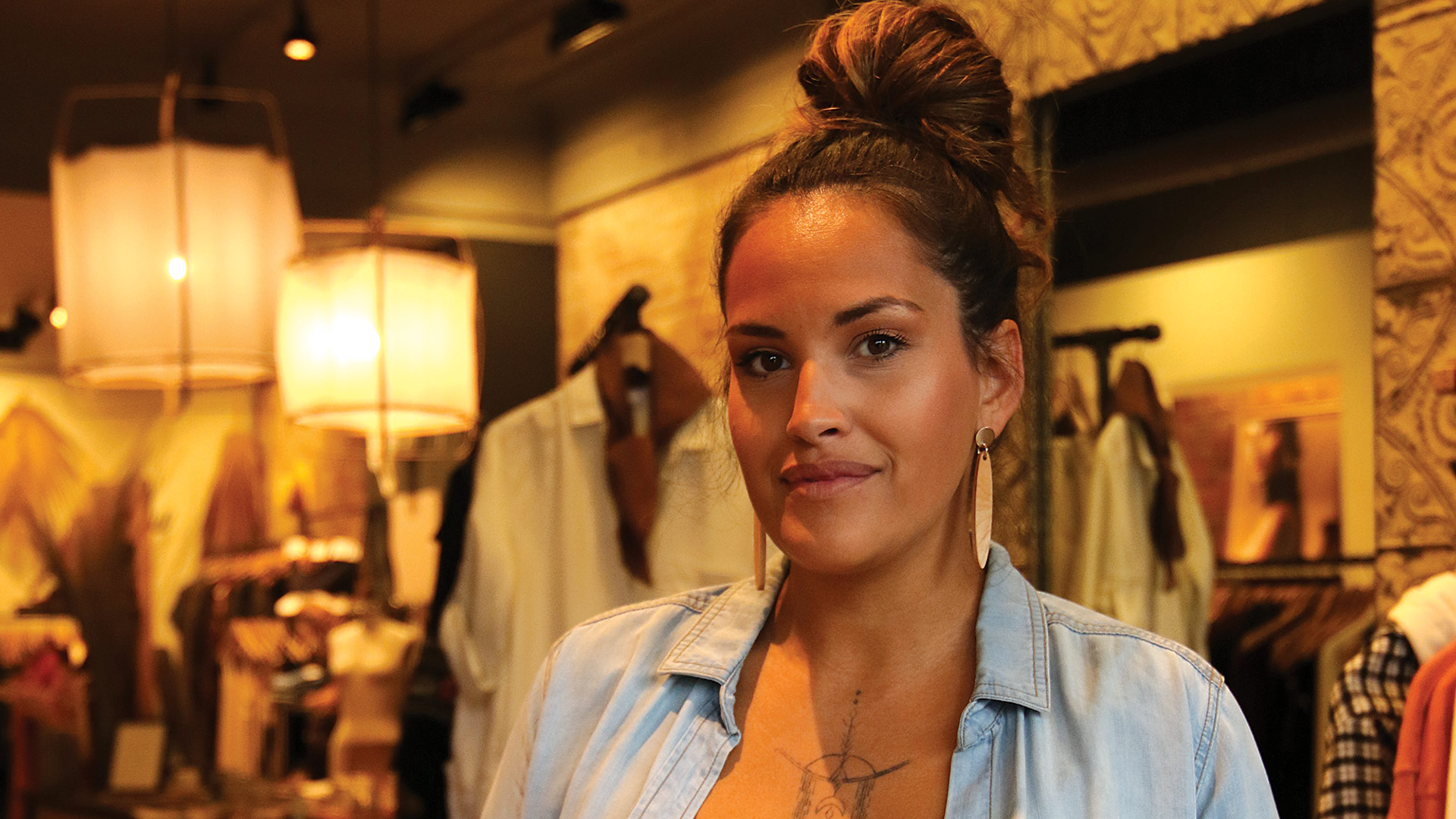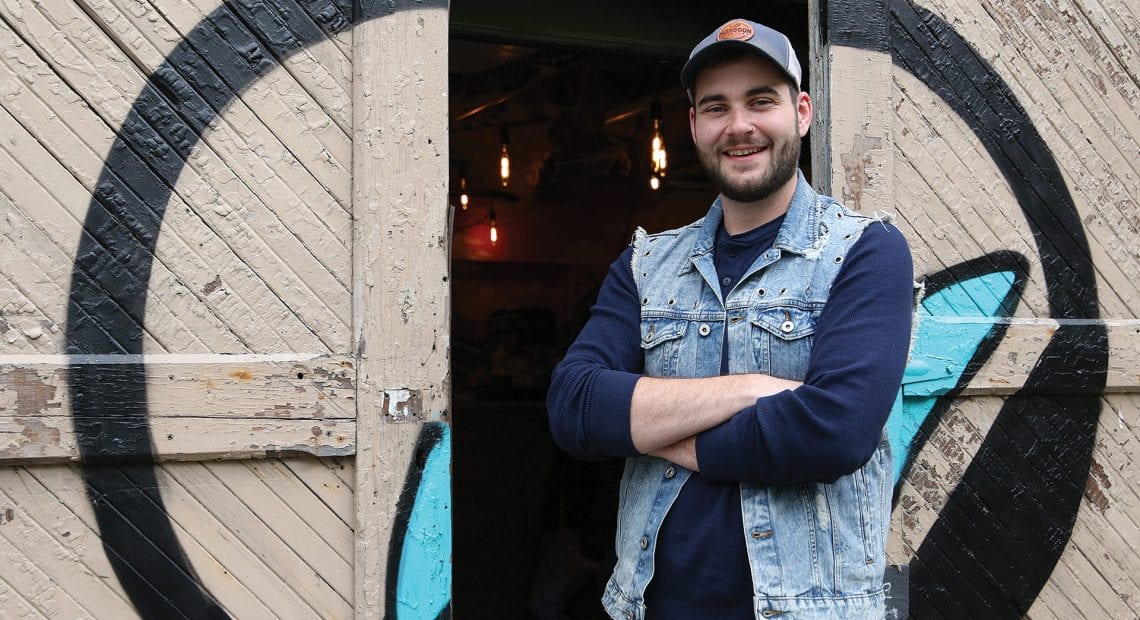Just Do Something

Monsoon Roastery owner Tim Monson
It’s no secret that the call to action to find more ways to go green is growing every day. With eco-friendly movements like plastic-bag bans and solar panels on the rise, it is easier than ever to find ways to help the environment — and it isn’t just individuals who are making this effort. Small businesses in Western Mass. are doing their part to reduce their carbon footprint — and also saving a little money in the process.
Try to think of a restaurant or business that produces only one 13-gallon trash bag at the end of each week.
Impossible? Not quite. For Tim Monson, owner of Monsoon Roastery in Springfield, this is a regular occurrence.
Admittedly, this is an impressive feat for a roastery that pumps out coffee on a daily basis. One of the first things he and wife, Andrea, started doing when they opened their roastery on Gasoline Alley in September 2018 was collecting coffee compost.
“It’s a great way to reduce waste, because all of a sudden you’re taking 50 or 60 pounds a week and removing that from the trash system and turning that into a renewable resource,” he said.
Food waste can be a difficult process to navigate, but Monson isn’t the only local business owner doing his best to reduce his carbon footprint through methods like composting.
“In this day and age, there’s just no reason not to be making that slight extra effort to do things the right way. It’s also smart from a business sense. You’re going to be a more profitable business if you have less waste. It might be slightly harder in some respects, but only from a logistical point of view.”
For Aimee Francaes, co-owner of Belly of the Beast in Northampton, just one five-gallon bag of trash is produced at the end of each night. With two composting bins in the back of the restaurant, this small business is producing astonishingly low amounts of food waste.
“We try to have as little waste as humanly possible,” she said, adding that part of the business model is not leaving much waste to dispose of in the first place. “Really, getting every little tiny bit we can out of the wonderful animals that come to our doors, and produce as well, that’s a big part of how we go about our business.”
In the U.S., it is estimated that between 30% and 40% of the food supply is wasted. According to the Massachusetts Department of Environmental Protection (DEP), in Massachusetts alone, food waste and other organic material made up about 25% of the total waste stream in 2016.
In addition to composting, Francaes and Monson use other methods to try to reduce this number. For example, Monson says each hot coffee cup sold is compostable. On the restaurant side, Francaes tries to cut down on the number of cups and side plates she serves customers at the restaurant and doesn’t sell bottles of water.
“In this day and age, there’s just no reason not to be making that slight extra effort to do things the right way,” she continued. “It’s also smart from a business sense. You’re going to be a more profitable business if you have less waste. It might be slightly harder in some respects, but only from a logistical point of view.”
Right up the street from Belly of the Beast, the owners and managers of Ode Boutique make decisions that are both business- and environment-smart every day, from where they get their clothes to how they sell them.

Aimee Francaes says her restaurant produces just one five-gallon bag of trash each night.
Manager Jenessa Cintron knows how difficult it is to be environmentally friendly in the retail industry. From the plastic packaging clothing comes in to the plastic hangers on which clothes are displayed, it’s not exactly easy to be green. But the boutique still finds ways to do everything it can to help the environment. This includes looking at the designers it buys from to determine what efforts they are making up the chain.
“It’s so important to so many of our designers and makers — that’s a plus,” she said. “Especially if they’re using natural fibers, biodegradable fabrics, that kind of thing.”
What these small businesses are selling may be different, but they say their desire to do anything they can to help the environment is one that should be adopted by many more companies.
Resourcefully Responsible
For Cintron, this means setting an example for her children (ages 13 and 4, with another on the way).
“I want to try to have the smallest carbon footprint possible, and I want to be an example for my kids,” she said. “Being an example for the community is important, too. I think it’s important as a business to set an example and use your platform in a positive way.”

Jenessa Cintron not only strives to promote sustainable practices, but also looks for that quality in the designers she buys from.
Alison Annes, stylist at Ode Boutique, emphasized the importance of encouraging customers and buyers to know who’s using recyclable materials and why it’s important.
“One of the biggest things is being conscious of it and shopping more and more of the ones that are, and maybe less often of the others until they change their platform on how they recycle their packaging,” she said.
Cintron echoed that packaging is a huge part of the problem, and something she wishes would change.
“A lot of our clothing comes in plastic packaging, and we can’t recycle it,” she said. “We try to recycle as much as we can, all of our boxes and paper and everything, and we encourage our customers to use our reusable bags.”
Monson said he has a similar problem with the plastic packaging coffee comes in, but has not yet found a way to make use of it.
However, Monson and his wife and friends did find a way to use several other materials to create the coffee shop’s decidedly quirky vibe.
“The retail area of our place is mostly made out of repurposed materials, from the barn doors that you walk through when you come in down to the paint on the walls and the floor,” he said. “Even our espresso bar is put together from a used door.”
The desire to be a business that produces as little waste as possible started in college, where Monson earned a bachelor’s degree in business administration with a concentration in green and sustainable business practices.
“Part of our mission from the get-go was, how can we do what normally happens in a business, but a little cleaner and a little better in all areas?” he said. “For us, reducing what we throw in landfills is a no-brainer.”
One Step at a Time
What might be a no-brainer for business owners like Monson, Francaes, and Cintron might not be quite so easy for others to grasp. Luckily, each offered suggestions as to how people can do their part to help reduce their carbon footprint.
Francaes says she used to offer a side dish with cole slaw with every meal, but noticed it ended up in the bus bin because some people didn’t want it. She didn’t want to waste the food or spend the time putting another dish through the washer, so she lowered the prices slightly and added the side dishes as an option on the menu.
“It’s looking at your habits and movements each day and seeing what you can do differently,” she said. “From a personal standpoint, I think it’s a lot about changing habits.”
A habit Cintron and other employees at Ode Boutique adopted is using stuffing from other products when packaging bags for customers instead of buying more paper.
“We also ask customers first if they want all the paper to go along with it,” she said.
Another simple thing to consider is using something old and turning it into something new. At Monsoon Roastery, the entire ceiling is made up of an old fence that was dumped on the property.
“Part of our mission from the get-go was, how can we do what normally happens in a business, but a little cleaner and a little better in all areas? For us, reducing what we throw in landfills is a no-brainer.”
“We broke down the fence, stripped it, stained it, and sealed it, then we covered the whole ceiling with it,” said Monson. “It’s awesome to take a look around you and say, ‘can we give something new life?’”
The overarching lesson emerging from each of these three business owners is that there really are no excuses when it comes to being environmentally friendly, and that, while waste challenges vary from company to company, everyone can find some room for improvement — and those small steps add up.
“There are always little things you can do,” Monson said. “I think, if more people would make a small effort, together it would go a long way. We can all do our part in our own ways. We can’t all do everything, but we can all do something.”
Kayla Ebner can be reached at [email protected]





